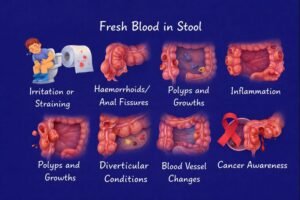Fresh Blood in Stool: Awareness and Possible Causes
Seeing fresh blood in stool can be concerning. Small amounts of fresh (bright red or maroon) blood often come from the lower part of the digestive tract, such as the rectum or lower colon. In some cases, blood may appear on toilet paper rather than directly in the stool.
First Aid & Workplace Relevance (Canada)
While digestive symptoms are not usually addressed through workplace first aid, awareness helps individuals understand when symptoms may relate to digestion, irritation, or longer-term health conditions. This can support conversations about diet, stress, and screening initiatives that are commonly promoted in Canadian public health settings.
Scenario (Mild & Realistic)
An office worker noticed a small streak of blood on toilet paper after a bowel movement. They made note of it, adjusted their fluid and fibre intake, and the symptom did not recur.
How Can Fresh Blood Appear in Stool?
Fresh blood often comes from the lower digestive tract. Colour and amount can vary based on location and cause. Some causes are mild and temporary, while others reflect underlying conditions that benefit from health assessment.
Possible Causes to Be Aware Of
Irritation or Straining
Bowel irritation from straining, hard stool, or friction can sometimes cause small amounts of fresh blood.
Haemorrhoids and Anal Fissures
Swollen veins (haemorrhoids) or tiny skin tears (fissures) near the anus may lead to bright red streaks or spotting on toilet paper. These symptoms can relate to constipation, pregnancy, prolonged sitting, or heavy lifting.
Polyps and Growths
Polyps are small growths in the colon. Some individuals undergo screening to monitor or remove polyps as part of preventive healthcare. Minor bleeding can sometimes occur during healing.
Inflammation
Conditions involving inflammation in the intestines may lead to bleeding. Causes can include immune-related conditions, changes in bowel habits, or infections from bacteria or parasites.
Diverticular Conditions
In some people, small pouches can form in the intestinal wall (diverticular disease). These pouches may become irritated or inflamed.
Blood Vessel Changes
Changes in intestinal blood vessels can also contribute to bleeding in some individuals.
Cancer Awareness
Digestive cancers, such as colorectal cancer, may involve bleeding among other symptoms. Public health screening programs in Canada emphasize early detection, especially for adults over 50 or those with family history.
Screening & Public Health Awareness
Canadian health authorities highlight colorectal cancer screening as part of routine preventive care for certain age groups. Screening options vary, including stool-based tests that can detect hidden blood. Participation supports early detection and improves long-term outcomes.
FAQ (Educational)

Not always. Common causes include irritation, straining, or haemorrhoids, though persistent or recurrent bleeding deserves assessment.
Can bleeding come from food?
Some foods change stool colour, but do not produce actual blood. Distinguishing colour from true blood can be difficult without testing.
Does the amount of blood matter?
Amount, colour, and frequency may offer clues, but only health professionals can evaluate underlying causes.
Is screening routine in Canada?
Yes. Many provinces offer colorectal screening for certain age groups through stool-based tests or other methods.
Educational Note
This content supports public and first aid awareness. Digestive symptoms can have many causes, and healthcare professionals can assist with screening, evaluation, and questions about persistent or unusual symptoms.
